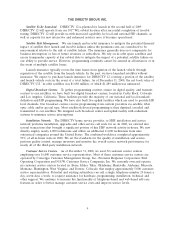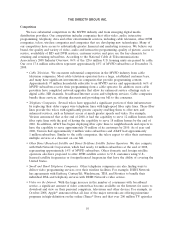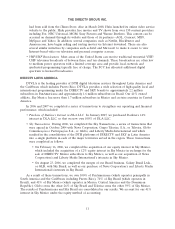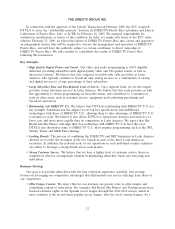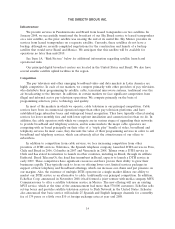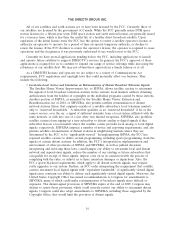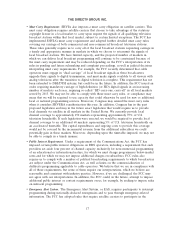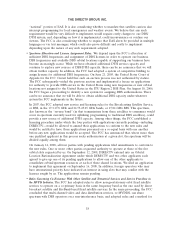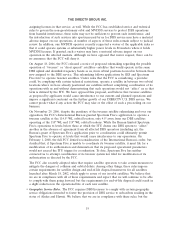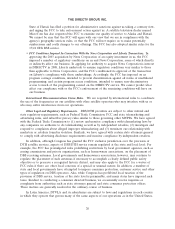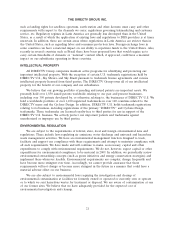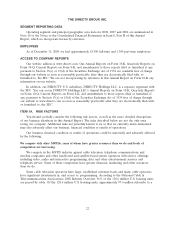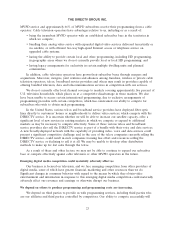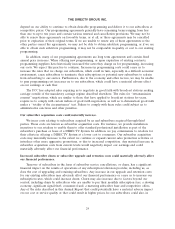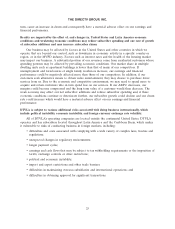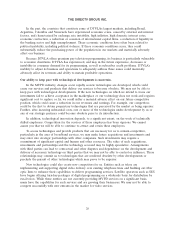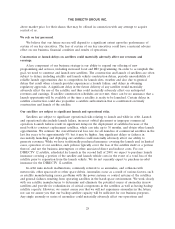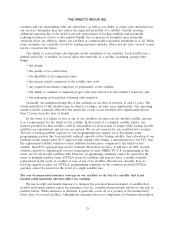DIRECTV 2008 Annual Report Download - page 32
Download and view the complete annual report
Please find page 32 of the 2008 DIRECTV annual report below. You can navigate through the pages in the report by either clicking on the pages listed below, or by using the keyword search tool below to find specific information within the annual report.THE DIRECTV GROUP, INC.
assigning licenses in that service, as well. While the FCC has established service and technical
rules to govern the non-geostationary orbit and MVDDS services to protect DBS operations
from harmful interference, these rules may not be sufficient to prevent such interference, and
the introduction of such services into spectrum used by us for DBS service may have a material
adverse impact on our operations. A number of aspects of these rules remain subject to judicial
review. In addition, one MVDDS operator recently requested a waiver of the applicable rules so
that it could operate systems at substantially higher power levels in 80 markets where it holds
MVDDS licenses. If granted, such a waiver may have a material adverse impact on our
operation in the affected markets. Although we have opposed that waiver request, there can be
no assurance that the FCC will deny it.
On August 18, 2006, the FCC released a notice of proposed rulemaking regarding the possible
operation of ‘‘tweener’’ or ‘‘short spaced’’ satellites—satellites that would operate in the same
DBS uplink and downlink frequency bands as us, from orbital positions located in between those
now assigned to the DBS service. This rulemaking follows applications by SES and Spectrum
Five LLC to operate tweener satellites. Under rules that the FCC is considering, a provider
could, by complying with certain technical restrictions, operate a satellite in between two orbital
locations where we have already positioned our satellites without completing coordination of its
operations with us and without demonstrating that such operations would not ‘‘affect’’ us as that
term is defined by the ITU. We have opposed this proposal, and believe that tweener satellites
as proposed by applicants would cause interference to our current and planned operations and
impose a significant constraint on the further growth of our DIRECTV U.S. DBS service. We
cannot predict what if any action the FCC may take or the effect of such a proceeding on our
business.
On November 29, 2006, despite the pendency of the tweener satellite rulemaking and over our
opposition, the FCC’s International Bureau granted Spectrum Five’s application to operate a
tweener satellite at the 114.5o WL orbital location, only 4.5o away from our DBS satellites
operating at the 110o WL and 119o WL orbital locations. While the Bureau limited Spectrum
Five’s operations to levels below those at which the ITU deems one DBS system to ‘‘affect’’
another in the absence of agreement from all affected DBS operators (including us), the
Bureau’s grant of Spectrum Five’s application prior to coordination could ultimately permit
Spectrum Five to operate at levels that would cause interference to our operations. On
February 1, 2008, the full FCC denied reconsideration of the International Bureau’s order, but
clarified that, if Spectrum Five is unable to coordinate its tweener satellite, it must file for a
modification of its authorization and demonstrate that its proposed operational parameters
would not exceed the ITU trigger for coordination. To date, Spectrum Five has neither
contacted us to attempt coordination of its tweener system nor filed for modification of its
authorization as directed by the FCC.
The FCC also recently adopted rules that require satellite operators to take certain measures to
mitigate the dangers of collision and orbital debris. Among other things, these rules impose
certain requirements for satellite design and end-of-life disposal maneuvers for all satellites
launched after March 18, 2002, which apply to seven of our in-orbit satellites. We believe that
we are in compliance with all of these requirements and expect that we will continue to be able
to comply with them going forward, but the requirements for end-of-life disposal could result in
a slight reduction in the operational life of each new satellite.
•Geographic Service Rules. The FCC requires DBS licensees to comply with certain geographic
service obligations intended to foster the provision of DBS service to subscribers residing in the
states of Alaska and Hawaii. We believe that we are in compliance with these rules, but the
19


